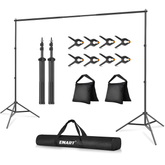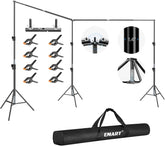Summer Photography: 8 Tips and Ideas for Amazing Results
In this article, I explain how you can capture stunning summer photos – no matter your level of experience and no matter your gear.
Specifically, I share:
- My favorite type of light for beautiful summer photography
- An easy mindset change that’ll quickly improve your photos
- My favorite way to find summer photoshoot locations
- Plenty of summer photography ideas to get you inspired!
So if you’re ready to create stunning shots, then let’s dive right in, starting with:
1. Pay attention to the summer sun
If you want to capture consistently gorgeous summer photos, then you must learn to master lighting – and that starts by paying careful attention to the sun.
Before heading out for a photoshoot, ask yourself:
1.Are there clouds?
2.Where is the sun positioned in the sky?
Clouds will diffuse the light, creating soft, even illumination that’s perfect for portraiture, flower photos, and forest landscapes. Clear skies, on the other hand, will produce hard, high-contrast light that’s great for street photos, but bad for pretty much everything else.
However, if the skies are clear, you can still get great light by shooting early in the morning or late in the afternoon. These times – known as the golden hours – feature soft, golden light that’ll create long shadows and reveal plenty of subject detail.

For that reason, wildlife photographers, bird photographers, portrait photographers, and landscape photographers all love to work during the golden hours, and I’m betting you will, too. Making this one change – that is, committing to working at sunrise and sunset – can dramatically enhance your images!
2. Shoot fireflies at night

Fireflies are a classic summer insect, but they can be hard to photograph – unless you know a handy little technique.
You see, to photograph fireflies, you shouldn’t try to capture individual insects. Instead, you should use a long exposure to photograph many fireflies over a few minutes (or hours).
So mount your camera on a tripod and point it toward a firefly hangout spot. Set the camera to Bulb mode (if your camera offers it). Then choose a lengthy shutter speed, one that will give the fireflies plenty of time to flit around your backyard. You might start at five minutes, but you can always increase or decrease the shutter speed depending on your results.
3. Do an underwater photoshoot
Summer and water-based fun go hand in hand, so why not put together an underwater photoshoot?
For this summer photography idea, you’ll need an underwater housing (or a waterproof camera). You’ll also need swim gear; if you’re doing a lengthy underwater shoot, then a snorkel or even scuba equipment is a good idea, but you can always start by holding your breath, diving, and shooting.

Underwater photography offers up lots of subjects and possible shots, including:
- Underwater landscapes
- Fish
- Light-and-water abstracts
- Underwater portraits
You’ll need to pay careful attention to your camera settings – it’s much darker beneath the water! – and if you find that you enjoy underwater photography, you may want to invest in an underwater flash.
4. Photograph the same subject for a week
Here’s a fun summer photography idea, one that’ll help your photos improve in leaps and bounds:
Pick a subject, such as a type of flower, a tree, a car, a landscape, or a person.
Then photograph that same subject over and over again, each day for a week.
Try to vary the time and weather so you get plenty of unique opportunities as you head out each day. And don’t use the same compositions, lighting, and settings each day. Mix it up!

If you shoot at midday on the first day, come back around sunset on the second day. And if you use a shallow depth of field on the third day, then use the fourth day to experiment with deep depth of field effects. Make sense?
Once the week is up, if you’ve enjoyed this challenge, you may wish to continue. Try photographing the same subject for a full month. You’ll be amazed by how much your images improve!
5. Photograph deliberately
Given the incredibly cheap cost of storage and the fast Burst modes offered by modern cameras, it’s often tempting to hold down that shutter button and shoot constantly.
But this “spray and pray” approach will simply result in hundreds – or even thousands – of photos, most of them bad. To find the good ones, you’ll need to wade through all of your files, which can be a huge chore.

So instead of holding down that shutter button, once you find a potential subject, take a deep breath. Ask yourself: Is my subject really worth photographing? Am I genuinely interested in this shot? Have I used the light and the composition to get the best possible results?
I’m not saying that you should never use your camera’s Burst mode. Fast shooting is highly useful if you’re photographing birds, wildlife, sports, or even street subjects.
But you should learn to work your Burst mode sparingly. Only use it when absolutely necessary.

6. Play around with different focal lengths
The summer is a great time to enjoy the outdoors, and it’s also a great time to explore different lenses.
Start by thinking about the lenses you used most frequently over the previous year. Then make a conscious effort to leave them at home.
And bring out your neglected lenses, the ones that sit on the shelf and rarely get much camera time.
Challenge yourself to take great photos with these neglected lenses. Put them in your bag, mount them on your camera, and see what you can come up with.

Working with different focal lengths is a great way to get out of your comfort zone, and it can help you produce highly creative images.
One tip, however: If you have a lot of unused lenses, just pick two or three and stick to those. Working with too many lenses will prevent you from really getting to know their specific focal lengths – and that will hold back your photos.
7. Explore your local area

Summer weather is perfect for walking, jogging, hiking, biking, boating, and so much more.
In other words, summer is the best time to head outside, have fun under the sun, and appreciate the power of nature.
That’s why I recommend you spend at least half an hour every day exploring the area around your house. You might start by going on a walk or a bike ride. Then see where you end up!
If you have good parks in your area, consider taking a weekend camping trip. Be sure to take plenty of photos, and dedicate some time to getting off the beaten path.
Pro tip: If you’re looking for places to photograph near your house, check Flickr, 500PX, or Instagram. You can simply search for your location, then scroll through the photos until you find something interesting. (If the location isn’t fully disclosed in the image caption, you can always try messaging the photographer.)
8. Photograph in bad weather

Bad weather can be a bummer – if you were planning a summer cookout, that is. But if your goal is to do summer photography, then bad weather can actually be very helpful.
You see, bad weather causes the crowds to disperse, which means you can visit places that are normally bustling with people. It’s a great way to get tourist-free shots of national-park classics, plus it can make for a more enjoyable experience.
Bad weather can also create interesting puddles, plenty of cloud drama, powerful light, and more – so the next time you sense bad weather, be sure to head outside!
Unfortunately, bad weather does tend to darken the sky, so you’ll often need to shoot with a wide aperture, a high ISO, or a tripod. Otherwise, you’ll risk camera blur.
Beaches are a great place to go right before or after a storm; the ominous clouds and rolling fog create ultra-dramatic scenes. You’ll need to prepare for rain and/or strong winds, though. Consider carrying a waterproof cover – or using a DIY cover – to keep your gear dry. (And whatever you do, don’t change lenses in sandy, windy, or wet conditions! You don’t want to end up with debris inside your camera or lens.)






